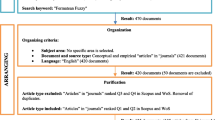Abstract
The treatment of solid waste is currently one of the major environmental problems facing municipalities. Thousands of tonnes of waste are generated each day, requiring a large area for disposal purposes. It is difficult to find suitable areas for the construction of such sanitary landfills as numerous criteria must be met, and landfill sites vary considerably in terms of their sophistication. The selection criteria for landfill sites should be as simple as possible, and with this in mind, we have evaluated a large number of random cases for the suitability of the site for landfill purposes using the recently advocated fuzzy approach. Using the fuzzy classification, we have attempted to develop a simple classification which uses only certain point values for available attributes. A normalized average of such attributes based on the proposed classifier is further evaluated using additionally generated random data sets. The results appear to be encouraging and indicate that the present classifier can be used as a substitute for the fuzzy-based ranking of landfill sites.
Similar content being viewed by others
References
Ahsan, N. (1999). Solid waste management plan for Indian megacities. Indian Journal Environmental Protection, 19(2).
Chang, L.-C., Chang, F.-J., & Tsai, Y. (2005). Fuzzy exemplar-based inference system for flood forecasting. Water Resources Research, 41, W02005.
Gupta, R., Kerwalramani, M. A., Ralegaonkar, R. V. (2003). Environmental impact analysis using fuzzy relation for landfill silting. Journal of Urban Planning and Development, 129(3).
Kansal, A., Prasad, R. K., & Gupta, S. (1998). Delhi municipal solid waste and environment-an appraisal. Indian Journal Environmental Protection, 18(2).
Klir, J., & Foger, T. A. (1988). Fuzzy sets, uncertainty, and information. Englewood Cliffs: Prentice-Hall.
Mahler, C. F. & Lima, S. A. D. L. (2003). Applying value analysis and fuzzy logic to select areas for installing waste fills. Environment Monitoring and Assessment, 84, 129–140, 200
Mamdani, E. H. (1974). Applications of fuzzy algorithms for simple dynamic plant. Proc. IEE, 121(12), 1585–1588.
Metternicht, G. (2001). Assessing temporal and spatial changes of salinity using fuzzy logic, remote sensing and GIS Foundations of an expert system. Ecological Modeling, 144, 163–179.
Morgan, S. M. (2004). Hazardous waste and solid waste management. Practice Periodical of Hazard, Toxic and Radioactive Waste Management, 8(3).
Rajiv S. (2003). Polycentric games and institutions In: McGinnis MD (ed) Readings Workshop Political Theory Policy Analysis. J Economic Behaviour and Organization, 52, 595–598
Seo, S., Aramaki, T., Hwang, Y., & Hanaki, K. (2003). Evaluation of solid waste management system using fuzzy composition. Journal of Environmental Engineering, 129(3).
Seo, S., Aramaki, T., Hwang, Y., & Hanaki, K. (2004). Environmental impact of solid waste treatment methods in Korea. Journal of Environmental Engineering, 130(1).
Shaleen, S., Sunil, P. (2001) Solid waste management in India: Status and future directions. TERI Information Monitor on Environmental Sciences, 6(1).
Shekdar, A. (1999). Municipal solid waste management-the Indian perspective. Journal of Indian Association for Environmental Management, 26(c), 100–108.
Singhal S, Pandey S (2001) Solid waste management in India – status and future direction. TERI Monitor Environ Sci 6:1–4
Solano, E., Dumas, R. D., Harrison, K. W., Ranji Ranjithan, S., Barlaz, M. A., & Downey Brill, E. (2002). Life-cycle based solid waste management II: Illustrative applications. Journal of Environmental Engineering, 128(10).
Todd, D. K. (1980). Ground water hydrology, 2nd Ed. New York: John Wiley and Sons
U.S. Environmental Protection Agency (1997) Characterization of municipal solid waste in the United States. 1996 Update. EPA/530-R-97-015 (May).
Zadeh, L. A. (1965). Fuzzy sets. Information and Controls, 8, 353–383.
Zadeh, L. (1983). The role of fuzzy logic in the management of uncertainty in expert systems. Fuzzy Sets and Systems, 11, 199–227.
Author information
Authors and Affiliations
Corresponding author
Rights and permissions
About this article
Cite this article
Ojha, C.S.P., Goyal, M.K. & Kumar, S. Applying Fuzzy logic and the point count system to select landfill sites. Environ Monit Assess 135, 99–106 (2007). https://doi.org/10.1007/s10661-007-9713-3
Received:
Revised:
Accepted:
Published:
Issue Date:
DOI: https://doi.org/10.1007/s10661-007-9713-3




